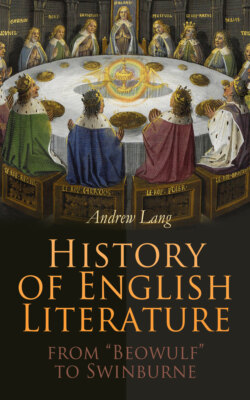Читать книгу History of English Literature from "Beowulf" to Swinburne - Andrew Lang, Robert Kirk - Страница 32
На сайте Литреса книга снята с продажи.
Walter Map.
ОглавлениеAmong his friends was a native of the Welsh border, Walter Map, Archdeacon of Oxford. "You write much, Master Gerald," said Map to him, "and you will write more; and I deliver many discourses. Your books are better than my speeches, and will be remembered longer; but I am much more popular, for you write in Latin, and I speak in the vulgar tongue," meaning French. Poor Gerald confesses that he made nothing by his books, and looked for his reward, not in vain, to the applause of future ages.
But Map has had his own share of praise, more than he should get, if, as he said, he wrote little. He was born about 1137, studied at Paris, was one of the king's judges who rode on circuit, and, in 1197, was made Archdeacon of Oxford. One book which he certainly wrote, "On Courtly Trifles" ("De Nugis Curialium," in Latin) is a collection of anecdotes clumsily told, and of reflections, with stories of the Welsh, historical jottings, folk-lore, tales, and attacks on the clergy of the Cistercian Order. As a judge he said that he was fair, except to Jews and Cistercians, "who did not deserve justice, for they gave none". Satirical Latin poems against Golias, a type of a noisy licentious Bishop, are also attributed to him. In the confession of this Bishop occur the famous lines, thus translated by Leigh Hunt,
I devise to end my days—in a tavern drinking;
May some Christian hold for me—the glass when I am shrinking;
That the Cherubim may cry—when they see me sinking,
God be merciful to a soul—of this gentleman's way of thinking.
The lines, in rhyming Latin, became a drinking catch, conceivably they were that before, and were merely put into the Bishop's mouth as a proof of his bad character. The word "Golias" as a nickname for a ribald "Philistine" priest was hundreds of years older than Map's time. A long romance in French, on Launcelot, the Holy Grail, and the death of Arthur, is attributed to Map in some manuscripts, and as a contemporary romancer says that Map "could lie as well as himself"—that is, like himself wrote romances of love and tournaments—he may possibly have been the author of "the great book in Latin which treats openly of the history of the Holy Grail". But no copy of that Latin book is known to exist, nor is it certain that it ever existed, while Map, as we know, said that he did not write much of any sort, especially not in Latin.
